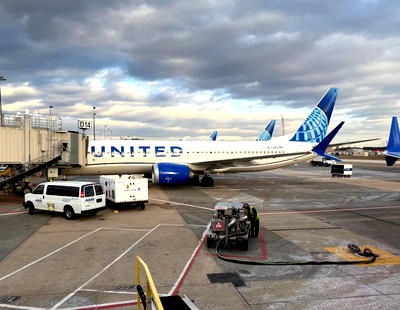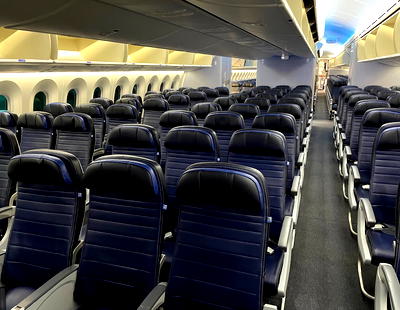On Saturday morning I was departing LAX terminal 7, and while waiting in line for my ID to be checked, two of the TSA’s wonderful behavior detection “officers” were making their way through the line. For those of you not familiar with the concept, here’s a description of the program from TSA blogger Bob:
Behavior analysis is based on the fear of being discovered. People who are trying to get away with something display signs of stress through involuntary physical and physiological behaviors. Whether someone’s trying to sneak through that excellent stone ground mustard they bought on vacation, a knife, or a bomb, behavior detection officers like me are trained to spot certain suspicious behaviors out of the crowd. Once we make our determination, we refer these passengers for additional screening or directly to law enforcement.
What does this really mean? Two guys who are qualified for the job simply because they don’t have a felony on their record take a half day course on spotting suspicious behavior and are thereby qualified to act as some sort of brilliant psychologist to determine when someone’s behavior is “suspicious.” In other words, as usual, our taxpayer dollars are being wasted. Instead of firing during a recession where air travel is down, the TSA instead chooses to make more work.
So what does this mean in practice? The “officer” asks the guy in front of me what the scissor symbol on his blazer represents. He asks me what my shirt means. I simply responded with “I don’t think that has anything to do with security,” and was quickly left alone. Boy, guess I got past him, since I had a bottle of water in my bag with at least four ounces in it. Who knows what I could have done with that!
So if you run into these idiots, don’t engage them. And if you feel like it, act nervous, bite your lips, and sweat profusely.
By the way, just to clarify, I wouldn’t be opposed to such a program if there were actually skilled behavior detection officers doing this, as opposed to unqualified people that have about three hours of job training.





Lucky,
Your a jerk. How do you how many hours of training he has? Walk a mile in his shoes before you judge and criticize! I got spit at when I was in the military, those people have the same ATTITUDE as you!!!!
Azi, Dan -- I think you're simplifying too much. The Israeli method does not rely so much on detecting involuntary physical behaviors, as these are very weak indicators; the more important indicators are people's stories as to where, why and how they're traveling, and this requires having a conversation with every passenger. Of course, it's impractical to give each passenger a 5-minute interview, and this is where profiling comes in, where passengers who fit a...
Azi, Dan -- I think you're simplifying too much. The Israeli method does not rely so much on detecting involuntary physical behaviors, as these are very weak indicators; the more important indicators are people's stories as to where, why and how they're traveling, and this requires having a conversation with every passenger. Of course, it's impractical to give each passenger a 5-minute interview, and this is where profiling comes in, where passengers who fit a low-risk profile get a very short interview (perhaps 1 or 2 sentences), while others are interviewed more extensively.
Israeli screeners do work by a book, and while the criteria for determining risk are not published (for security and other reasons), it's not hard to figure out what some of these are. Some of the criteria for profiling would be illegal in the USA, other parts of the world, and even in Israel, which regularly creates funny exchanges (e.g. when screeners try to determine your ethnic or religious background without asking about it directly). Other criteria for profiling, however, are perfectly legal (e.g. asking who owns the laptop you're carrying).
As for Dan's claim that everyone is trained, I can say from my own experience as a semi-frequent traveler to Israel who (probably) fits a medium-risk profile that it's very easy to spot newly-minted screeners and their awkward behavior when they try to apply their training to slightly complex situations. One thing they are trained for, though, is to very quickly call an experienced supervisor when they feel they're not sure how to handle a particular situation.
The BA sounds like BS to me. We should learn from the Israelis how to do things properly.
To Sam the first poster: I can assure you that a psychology degree is NOT a 3 hour course spread out over several years. If that was the case it would be far easier to qualify as a psychologist :). It requires a 4 year undergrad degree and 2 years of post graduate study/experience - all full time.
The TSA Behaviour detection experts are nowhere near close to being psychologists!
I was just about to chime in with that. In Israel's case, everyone is trained. I would hope that the TSA has trained their people properly. Please report back and tell us what your opinion is Ben.
This is the "profiling" method. While not allowed in US (so they gave it another name), it is proven to be the best method to prevent terrorism (this is how it is done in my country, Israel).
I bet it is more than $8 per hour.. and it is wasted money.. for sure.
really? you don't want to waste tax dollars for some guy 8 dollars an hour to spot terrorists but you want to pay someone 80 dollars an hour who's had essentially the same half day course drawn out over several years.
Real criminology expertise takes years and years of experience, and they are hard to come by, do you really want them at airports chasing "terrorists" or do you want them out catching real criminals.